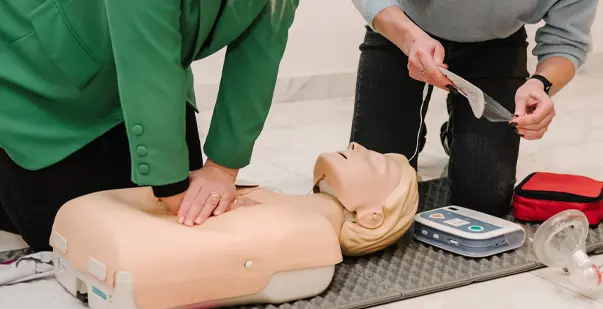If you are in the healthcare field, you may encounter megacodes at some point. You need to successfully complete a megacode to maintain employment. Do not worry if the situation is nerve-racking; you can prepare for emergencies and improve your survival chances. Pass ACLS megacodes to gain a better understanding of megacodes. Learn how you can master the skills needed to navigate situations well.
What is a megacode?
A megacode is a training exercise used in our online advanced cardiac life support (ACLS) courses to simulate real-life cardiac emergencies. The megacode examines a healthcare provider’s ability to manage medical situations. The scenarios use ACLS protocols and include several medical emergencies, such as pulseless ventricular tachycardia, ventricular fibrillation, and pulseless electrical activity (PEA).
Healthcare providers can improve skills and build confidence by practicing megapodes effectively. ACLS megacode training is crucial for medical professionals involved in emergency cardiac care.
Master ACLS Now
Get ACLS certified with confidence
How are megacodes used?
Megapodes are designed to provide healthcare professionals with hands-on practice in managing cardiac emergencies. These scenarios improve skills and the ability to make prompt decisions. Megacodes are used in several scenarios, including the following:
Assess skills:
- Scenario-based learning: Megacodes involve simulated cardiac arrest scenarios that resemble real-life emergencies. Participants encounter several cardiac conditions, such as style and ventricular fibrillation. These scenarios help learners apply knowledge in real-life situations.
- Follow algorithms: Participants must follow ACLS megacodes algorithms rigorously. This teaches key guidelines to apply in emergencies. The scenarios cover ACLS interventions such as medical administration and high-quality CPR, among several others.
Enhance team dynamics:
- Team coordination: Megacodes stresses the importance of effective teamwork and clear communication. Participants practice team coordination, assigning roles, and managing a situation. This encourages a collaborative approach and identifies strong leaders within the team.
- Role assignments: In a megacode, the common roles are team leader and IV/medication administrator. Each team member practices the responsibilities, ensuring that they are prepared for a real-life cardiac emergency.
Critical thinking and real-time decision-making:
- Dynamic decision-making: Megacodes simulate the unpredictable nature of cardiac emergencies. This requires participants to think critically and make timely decisions. This sharpens their ability to handle changing patient conditions and choose the appropriate interventions.
- Feedback: After each megacode, participants receive feedback immediately from instructors. This session helps identify strengths, addresses weaknesses, and introduces correct practices. Constructive feedback is beneficial in helping learners understand everything they need to improve.
Building confidence:
- Repetition and mastery: Regular practice of megacodes makes you confident. It prepares you for uncertain times. The repetition of these scenarios ensures that the providers can perform interventions on time.
Read More: ACLS Certification in Utah
What to expect during a megacode?
During a megacode, you can expect to be the primary caregiver. If you are completing the menaced win, you will be alone in the room with the instructor. During this time, the instructor will offer minimal assistance. You must assess the patient, reach a conclusion, and show your skills. You can complete some megacodes online. In these scenarios, you will be responsible for all aspects of the code. Furthermore, you can complete it entirely on your own.
The length of megapodes is based on the purpose of the activity. In certain cases, several scenarios may be included in a single megacode experience.
Read more: Post-cardiac arrest care (ACLS)
Master ACLS Now
Get ACLS certified with confidence
How to prepare for an ACLS megacode?
Preparing for an ACLS megacode involves understanding the ACLS protocols and being ready to apply them in emergencies. It is crucial to stay updated with the latest guidelines. Regular practice can build confidence and improve performance. Things to focus on while preparing for an ACLS megacode:
- Review ACLS algorithms: Memorizing megacode ACLS algorithms is crucial. These help manage cardiac emergencies and cover assessments and interventions. Study the algorithms, such as style and ventricular fibrillation.
- Practice high-quality CPR: High-quality CPR is crucial in a cardiac arrest. Make sure that you can perform chest compressions correctly. Understand the importance of minimizing interruptions. Practice using a manikin and build muscle memory. This will help improve your technique.
- Master airway management: Learn to use devices such as bag-valve masks and supraglottic airways. Practice these skills to maintain adequate ventilation and oxygenation during a megacode scenario.
- Know the medications: Study the medications and learn their dosages and indications. Study the drugs, such as amiodarone and epinephrine. Know their side effects and the correct timing for administering medications during a cardiac event.
- Improve team communication skills: Effective communication in high-stress environments like a megacode. Practice concise communication and use closed-loop communication techniques. This helps ensure that everybody understands their roles and responsibilities. Regular team drills improve coordination and efficiency.
Read more: Is ACLS Medical Training Legit?
Conclusion
Review the ACLS megacode algorithm and practice high-quality CPR and airway management skills. Know the medications and study the protocols. Enhance your team’s communication skills and ensure timely interactions. Gain knowledge and apply it in life to handle the complexities of an ACLS megacodes scenario confidently.







